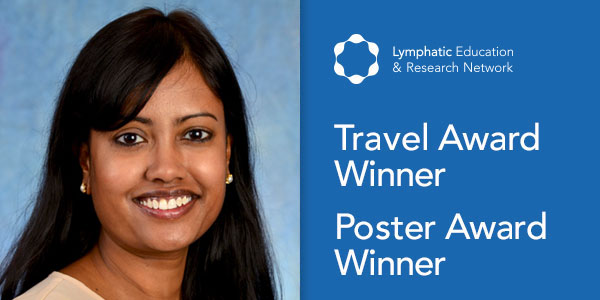Reema Biswas Davis, PhD, currently a postdoc at University of North Carolina at Chapel Hill, under the supervision of Kathleen Caron, PhD, received a Travel Award from LE&RN to attend the 2017 Lymphatics Forum in Chicago. We asked Reema to share her thoughts on that experience with us and to tell us a bit about her research and future plans.
1. What did you get out of the Forum? Why did you feel it was important to attend?
Many leaders of the lymphatic field were present at this Forum and it was an honor to present my data and receive helpful feedback. As scientists, we tend to focus on a very specific questions. Therefore, it is always great to hear from people addressing similar questions with different approaches, especially when you realize that our puzzle pieces may fit together and potentially accelerate research. In addition, hearing about different ailments that lymphatic patients suffer from is very motivating. Many thanks to LE&RN’s Travel Award for making my attendance possible and for the Poster Award as well!
2. What are your areas of interest in research?
I am very interested in vascular biology and all facets of diseases and organs that they influence. Currently I am trying to parse out the key players in organ-specific lymphatic vessel functioning and also characterizing a novel genetic cause of non-immune hydrops fetalis.
3. What are your hopes and plans for your career and your research?
During the course of my postdoctoral training, I hope to contribute to this field and identify a niche for myself that intrigues me the most, on which I can continue to work of my own accord.
4. Why do you believe that, in general, lymphatic research is important? What might the field accomplish within the next few years?
The very existence of lymphatic vessels is news to many! Yet these vessels are present almost everywhere in our body and play very critical roles and damage to these vessels can have profound consequences. Recently, scientists discovered lymphatic or lymphatic-like vessels in organs that were previously believed to not have any lymphatics and identified varied origins of these vessels in different organs. Lymphatic research is critical and much remains to be known. In the next several years, I see lymphatic researchers identifying more druggable targets that might prove beneficial to wide array of diseases.
Programs such as LE&RN's Travel Awards program advance the scientific community's understanding of lymphedema and lymphatic diseases, allows for increased communication between researchers, and raises the profile of lymphatic research. These programs are only possible as a result of the generosity and dedication of LE&RN's corporate sponsors and Supporting Members. If you are committed to LE&RN's mission of fighting lymphedema and lymphatic disease through education, research, and advocacy, become a LE&RN Supporting Member today.

